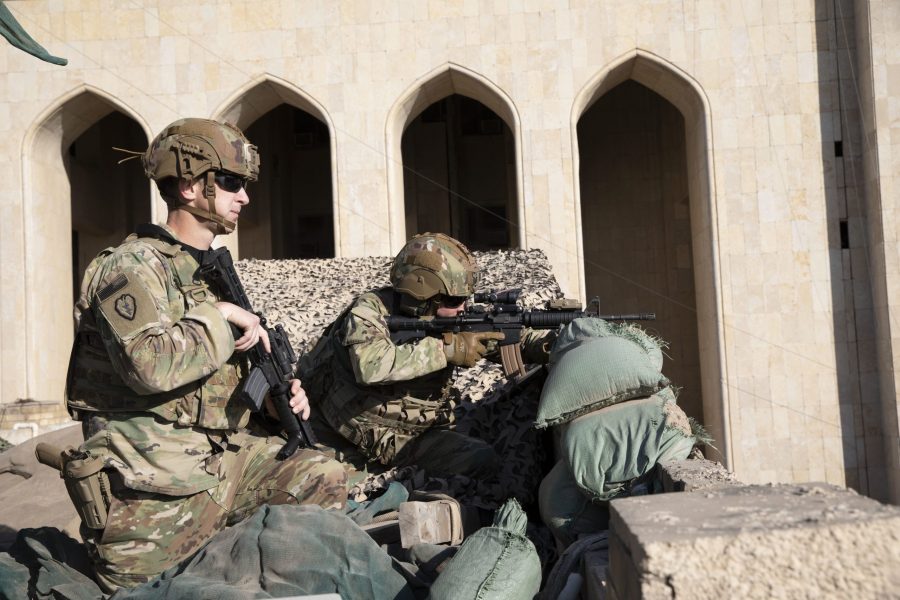The Iraqi Parliament voted to kick US forces out of the country and the American-led coalition has suspended all operations targeting the Islamic State group, in continued fallout from the recent killing of Iran’s top general in Baghdad.
The Jan. 5 resolution is a public rebuke of the US, but it is not legally binding. The government must still officially rescind the invitation to US forces to conduct anti-ISIS operations in the country. Iraqi Prime Minister Adel Abdul Mahdi, who spoke publicly in support of the resolution, resigned in November and is serving in a “caretaker” role, but he is not authorized to enact new laws.
Iran has promised revenge for the Jan. 3 drone strike, which took out Qassem Soleimani along with the leader of the Iran-backed Popular Mobilization Forces at the Baghdad airport. In response, President Donald Trump has taken to Twitter to threaten destruction of 52 sites, including those “important to Iranian culture,” which he says will be hit, “VERY FAST AND VERY HARD” if Iran targets any US personnel or assets.
“They attacked us, & we hit back. If they attack again, which I would strongly advise them not to do, we will hit them harder than they have ever been hit before!” Trump tweeted.
Iraq’s Foreign Ministry has “summoned” the US ambassador to appear in Baghdad to discuss the strike. “The Foreign Ministry considers these illegal military operations carried out by the United States to be an attack and a condemned act that is causing tension to escalate in the region at a time when the US administration should cooperate with Iraq in reducing security tension and resolving the crises that afflict the region,” according to an Iraqi statement.
The Ministry also sent official complaints to the president of the Security Council and the secretary-general of the United Nations, calling “on the Security Council to condemn the bombing and assassinations,” according to another statement.
Secretary of State Mike Pompeo, making the rounds on talk shows Jan. 5, said the US is monitoring the Iraqi Parliament’s decision “very closely.”
“It is the United States that is prepared to help the Iraqi people get what it is they deserve and continue our mission there to take down terrorism from ISIS and others in the region. That is in defense of the Iraqi people and is good for America too,” Pompeo said on CBS.
In the face of ongoing threats from Iran, Pompeo said the US is “prepared for everything” and is still working to convince the Iranian regime to “behave like a normal nation.”
“We are going to restore deterrence,” he said on NBC’s Meet the Press.
The Pentagon, shortly after the strike, said it was focused on deterring future Iranian attack plans. Soleimani, the leader of Iran’s Quds Force and chief architect of Iran’s influence in the Middle East, has been linked to many attacks on US personnel over the years, including providing weapons and direction to militias that have killed hundreds of US troops in the Iraq war. More recently, the Pentagon said he was behind the Dec. 27 attack on a US base in Kirkuk that killed an American contractor, and the Dec. 31 storming of the embassy in Baghdad.
Through the weekend, Iranian-backed militias targeted US locations, including the embassy compound in Baghdad and an air base in Balad, with rockets. However, there was no extensive damage or injuries, the US-led coalition said in a statement.
The coalition is now “fully committed to protecting the Iraqi bases that host coalition troops. This has limited our capacity to conduct training with partners and to support their operations” against ISIS, so those activities are “paused,” subject to review.
“We remain resolute as partners of the government of Iraq and the Iraqi people that have welcomed us into their country to help defeat ISIS. We remain ready to return our full attention and efforts back to our shared goal of ensuring the lasting defeat of [ISIS].”
NATO also has suspended its training mission in Iraq and will hold an emergency meeting on Jan. 6.
The US sent ample reinforcements to the region, including the entire 1st Brigade Combat Team from the 82nd Airborne, consisting of about 3,500 soldiers. Over about five days, several USAF C-17s have ferried the soldiers to Kuwait.
The Pentagon has steadily built up its presence in the region, including the deployment of a bomber “task force”, along with additional fighter squadrons and surveillance aircraft. The Air Force has established a new expeditionary wing at Prince Sultan AB, Saudi Arabia, as the tensions increased. Air Forces Central Command, in response to an Air Force Magazine query, deferred questions on increased airpower in the region and increased security at bases throughout the Middle East.
